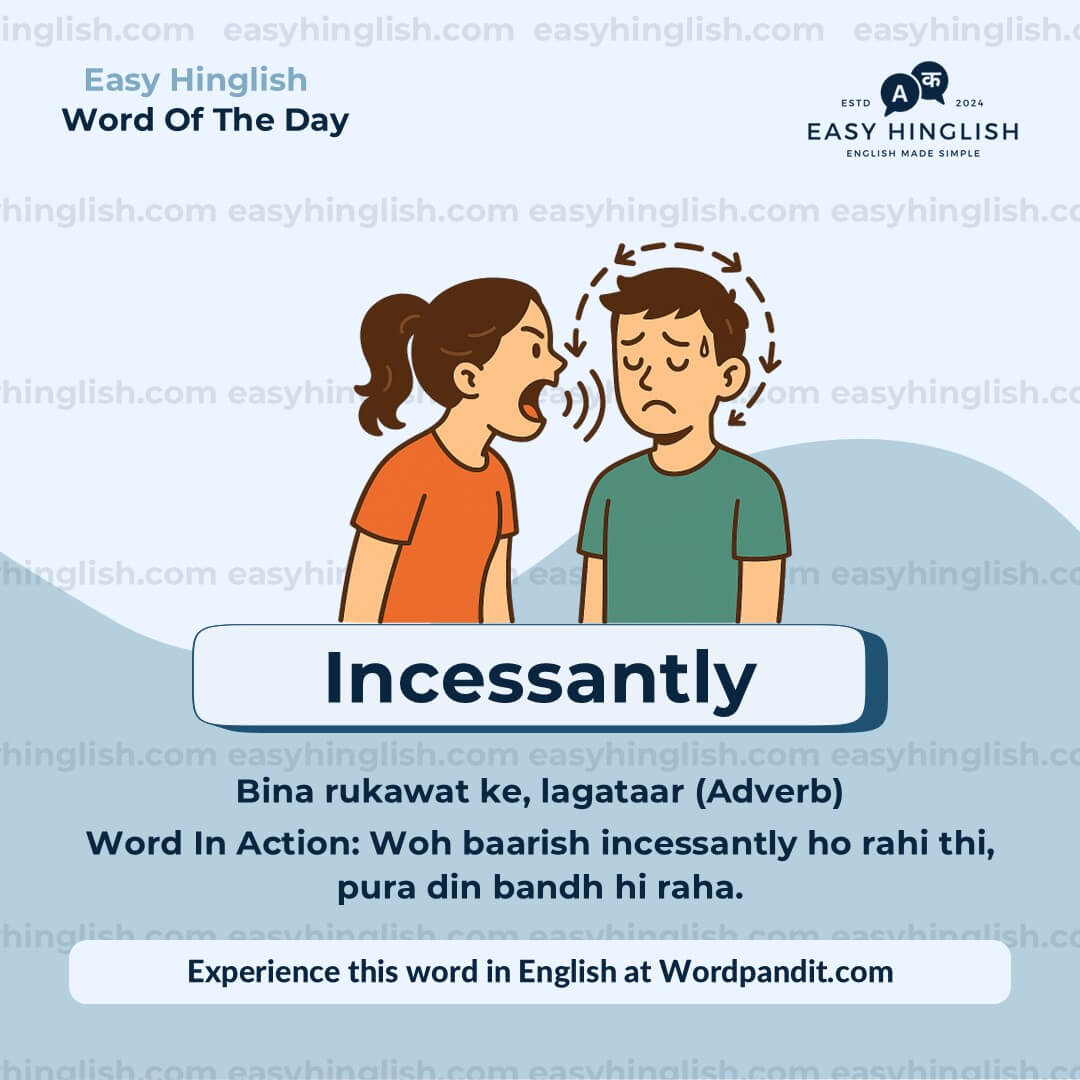Daily Vocabulary International Newspapers aur Publications se Seekho
Wordpandit ke Global Vocabulary Hub ke Saath Apni Vocabulary Expand Karo
Wordpandit par, hum aapko ek truly global vocabulary develop karne me madad karte hain, jo duniya ke sabse respected international publications se li gayi hoti hai. Yeh section aapko naye words se introduce karne ke liye design kiya gaya hai jo global conversations aur trends ko define karte hain.
Global Sources ka Power
Aapko globally sochne aur communicate karne me madad dene ke liye, hum vocabulary curate karte hain world ke top international sources se, jaise:
- The New York Times
- The Washington Post
- BBC
- The Guardian
- The Economist
- Scientific American
- Psychology Today
- Aur bhi bahut saare...
Globally Socho, Competitively Seekho
Hamare daily updates se aap international publications ke naye words seekhoge jo global news aur developments se jude hote hain. Isse aapki vocabulary current bhi rahegi aur globally relevant bhi.
Apni Global Soch Ko Expand Karo
Agar aap international exams ki tayari kar rahe ho, global business communication me excel karna chahte ho, ya sirf apni language skills improve karna chahte ho, toh Wordpandit aapko global level pe grow karne ke liye best resources provide karta hai.
Smart Learning, Global Reach
Hamari learning methodology me global examples, memory aids, aur interactive activities shamil hain, jo naye words ko effectively yaad karne aur real-world me use karne me madad karti hain.
Aaj Hi Apni Global Vocabulary Journey Shuru Karo!
Wordpandit Kyun Choose Karein?
Practical Learning: Aise words seekho jo real-world reading aur communication me aapko sach me kaam aayenge, taaki aapki comprehension aur bolne ki skills improve ho.
Diverse Content: Current affairs se lekar scientific breakthroughs tak, hamare different sources aapko multiple domains ki vocabulary seekhne ka moka dete hain.
Effortless Integration: Wordpandit ko apni daily routine ka part banao. Sirf kuch minute har din dene se aapki vocabulary time ke saath kaafi improve ho sakti hai.
Vocabulary Mastery Tak Ka Aapka Safar
- Regularly hamare Daily Vocabulary section ko visit karo
- Naye words explore karo aur unka context me use samjho
- In words ko apni writing aur bolne ki practice me use karne ki koshish karo
- Jaise-jaise aapke words badhte hain, apni progress ko track karo
Aaj Hi Apni Vocabulary Journey Shuru Karo!
Wordpandit ke saath vocabulary improve karna start karo. Roz thoda effort dalne se aap ek strong vocabulary develop kar sakte ho jo academic, professional, aur personal life me kaafi kaam aayegi.
Yaad rakho, ek naya shabd roz seekhna linguistic limitations ko door karne ka best tareeka hai! Wordpandit ko apni daily learning journey ka sathi banao aur vocabulary excellence ki taraf badho!
WORD-1: Utterance
Sandarbh (Context):
"This utterance achieves several different effects." - Psyche
Vyakhya (Explanatory Paragraph):
"Utterance" ka matlab hota hai koi bhi baat ya shabd jo zubaan se bola gaya ho. Chahe wo ek choti si baat ho ya poora sentence, agar woh boli gayi hai, to woh ek utterance hai. Yeh shabd aksar psychology, literature, aur communication theory mein use hota hai, jahan yeh sirf baat nahi balki tone, intention, aur effect pe bhi zor deta hai. Matlab — kya bola gaya, kaise bola gaya, aur kyu bola gaya — sab important hai.
Arth (Meaning): Bola gaya shabd ya vaakya (Noun)
Uccharan (Pronunciation): UHT-er-uhns
Kathinai Star (Difficulty Level): ⭐⭐ Beginner
Utpatti (Etymology): Middle English "uteren" (bolna) + "-ance" (action ya noun banane wala suffix)
Prashant Sir Ke Tathya (Prashant Sir's Notes):
"Utterance" ko aksar communication theory ya language analysis mein dekha jaata hai. Yaad rakho: yeh shabd bolne ki kriya ko dikhata hai, sirf content ko nahi.
Samanarthi & Vipritarthi (Synonyms & Antonyms):
Samanarthi (Synonyms): statement, remark, comment, expression, declaration
Vipritarthi (Antonyms): silence, quiet, hush, mute response
Udaharan (Usage Examples):
- Uska aakhri utterance poore room ko sann kar gaya.
- Uski har utterance mein ek emotional gehraai hoti thi jo sabko chhoo jaati thi.
Sanskritik Sandarbh (Cultural Reference):
"Let your utterances be few." — Bible ka yeh message yeh sikhata hai ki hamesha soch samajh kar bolna chahiye. - Biblical Literature
Sochiye (Think About It):
Aapke kehne ka andaaz (tone) kaise kisi utterance ka meaning badal sakta hai, jabki words wahi rahte hain?
Chhoti Kriya (Quick Activity):
Roz marra ke paanch aise utterances likho jo aap use karte ho (jaise "hello", "kya baat hai", "oh no!") — unmein chhipe emotions aur intentions identify karo.
Yaad Karne Ka Tarika (Memory Tip):
"Utterance" yaad rakhne ke liye socho ki aapne koi baat "utter" ki — matlab, muh se kuch bola. Jo bola gaya, wahi utterance hai.
Vastavik Jeevan Me Upyog (Real-World Application):
Law, linguistics, therapy, aur public speaking jaise fields mein "utterance" samajhna zaroori hai, kyunki kya bola gaya, kaise bola gaya — iska asar bohot gehra hota hai.
WORD-2: Miraculous
Sandarbh (Context):
"This is a near-miraculous use of language." - Psyche
Vyakhya (Explanatory Paragraph):
"Miraculous" ka matlab hota hai kuch aisa jo itna extraordinary ya unbelievable ho ki lagta hai jaise kisi chamatkar se hua ho. Aksar isme ek spiritual ya divine touch bhi feel hoti hai. Jab koi cheez normal conditions mein impossible lagti hai, lekin fir bhi ho jaati hai, to hum use "miraculous" kehte hain. Jaise kisi ka accident ke baad tezi se recover hona ya impossible lagne wale match mein jeet jaana.
Arth (Meaning): Atyadhik asadharan ya chamatkarik (Adjective)
Uccharan (Pronunciation): mih-RAK-yuh-luhs
Kathinai Star (Difficulty Level): ⭐⭐ Beginner
Utpatti (Etymology): Latin "miraculum" se aaya hai, jiska matlab hai "wonder ka object", aur yeh "mirari" (to wonder at) se nikla hai.
Prashant Sir Ke Tathya (Prashant Sir's Notes):
"Miraculous" tab use karo jab koi cheez impossible lagti ho ya divine power jaisi feel ho. Literal aur metaphorical dono context mein use ho sakta hai.
Samanarthi & Vipritarthi (Synonyms & Antonyms):
Samanarthi (Synonyms): amazing, extraordinary, phenomenal, supernatural, wondrous
Vipritarthi (Antonyms): ordinary, normal, mundane, expected, natural
Udaharan (Usage Examples):
- Uska accident ke baad recover hona ekdum miraculous tha.
- Team ne last moment mein ek miraculous comeback kiya.
Sanskritik Sandarbh (Cultural Reference):
"The miraculous birth of Christ" — Christianity mein yeh concept divine intervention aur hope ka pratinidhitva karta hai. - Christian Theology
Sochiye (Think About It):
Ek event "miraculous" kab ban jaata hai — kya sirf uska hona kaafi hai, ya belief bhi zaroori hai?
Chhoti Kriya (Quick Activity):
Apni life ya history se do aise moments likho jo aapko miraculous lage. Aur batayein ki kyun aapne unhe miraculous kaha.
Yaad Karne Ka Tarika (Memory Tip):
"Miraculous" yaad rakhne ke liye bas socho — agar kuch "miracle" jaisa lage to woh miraculous hai!
Vastavik Jeevan Me Upyog (Real-World Application):
Journalism, kahani likhne, aur motivational speeches mein "miraculous" word aksar un events ke liye use hota hai jo hope aur wonder inspire karte hain — jaise kisi ka bach jaana, bada invention, ya sports ka magic moment.
WORD-3: Incessantly
Sandarbh (Context):
"Most people produce them incessantly, and often with effects just as rich as Romeo’s." - Psyche
Vyakhya (Explanatory Paragraph):
"Incessantly" ka matlab hota hai koi kaam ya kriya lagataar hona — bina rukke, bina kisi break ke. Yeh shabd aksar thoda negative sense mein use hota hai, jaise jab koi baar-baar koi annoying ya exhausting kaam karta hai. Is sentence mein iska matlab hai ki log continuously aise expressions create karte hain jo kabhi kabhi Romeo jaise poetic aur rich hote hain — bina uska poora ehsaas kiye.
Arth (Meaning): Bina rukawat ke, lagataar (Adverb)
Uccharan (Pronunciation): in-SESS-uhnt-lee
Kathinai Star (Difficulty Level): ⭐⭐⭐ Intermediate
Utpatti (Etymology): Latin se aaya hai: "in-" (not) + "cessare" (rukna)
Prashant Sir Ke Tathya (Prashant Sir's Notes):
“Incessantly” un cheezon ke liye perfect hai jo baar-baar, bina ruke hoti hain — jaise kisi ka nonstop bolna, kaam karna, ya tension lena. Use karte waqt tone ka dhyan dena zaroori hai!
Samanarthi & Vipritarthi (Synonyms & Antonyms):
Samanarthi (Synonyms): constantly, endlessly, ceaselessly, perpetually, unremittingly
Vipritarthi (Antonyms): occasionally, intermittently, rarely, sporadically
Udaharan (Usage Examples):
- Woh kutta poori raat incessantly bhonkta raha — sab pareshan ho gaye.
- Meeting ke dauraan woh lagataar phone check karti rahi — kisi baat par dhyan nahi diya.
Sanskritik Sandarbh (Cultural Reference):
Dostoevsky ke novel *Crime and Punishment* mein protagonist ke thoughts incessantly chalte hain — unki mental struggle ko dikhane ke liye. - Russian Literature
Sochiye (Think About It):
Aaj ke zamane mein kaunse habits — jaise notifications check karna ya scrolling — incessant ho gaye hain? Kya yeh hamesha harmful hote hain?
Chhoti Kriya (Quick Activity):
Tin aise kaam sochiye jo aap ya aapke aaspaas ke log lagataar karte hain. Fir sochein — kya yeh kaam productive hain, neutral hain, ya harmful?
Yaad Karne Ka Tarika (Memory Tip):
“Incessantly” yaad rakhne ke liye sochiye: “in” + “cessantly” = not ceasing = bina rukke hota rahega!
Vastavik Jeevan Me Upyog (Real-World Application):
"Incessantly" ka use aksar likhne aur bolne mein hota hai jab kisi action ka lagataar hona dikhana ho — jaise nonstop noise, work pressure, ya even lagataar creativity.
WORD-4: Exodus
Sandarbh (Context):
"By Tuesday about 6,000 people – although some estimates put the exodus at nearly twice that – had followed suit, using any means available: planes, boats and even private yachts and pleasure launches." - The Guardian
Vyakhya (Explanatory Paragraph):
"Exodus" ka matlab hota hai kisi jagah se logon ka ek saath, bade scale par nikalna — aksar mushkil ya urgent circumstances mein. Yeh shabd tab use hota hai jab kisi region, city ya country se log war, natural disaster, persecution ya economic crisis ki wajah se nikalte hain. Is context mein log har possible transport use karke escape kar rahe hain — urgency aur scale dono ko highlight karta hai.
Arth (Meaning): Ek saath logon ka jagah chhodna; jan-sankhya ka palayan (Noun)
Uccharan (Pronunciation): EK-suh-duhs
Kathinai Star (Difficulty Level): ⭐⭐⭐ Intermediate
Utpatti (Etymology): Greek "exodos" se — "ex-" (bahar) + "hodos" (raasta)
Prashant Sir Ke Tathya (Prashant Sir's Notes):
"Exodus" ka use tab karo jab ek large group log kisi wajah se jagah chhodta hai — chahe zabardasti ho ya apni marzi se. Yeh thoda dramatic ya historical tone deta hai, isliye sahi context mein use karo.
Samanarthi & Vipritarthi (Synonyms & Antonyms):
Samanarthi (Synonyms): departure, evacuation, migration, flight, retreat
Vipritarthi (Antonyms): arrival, influx, return, immigration
Udaharan (Usage Examples):
- Political unrest ke wajah se city se families ka exodus shuru ho gaya.
- Toofan aane se pehle coastal towns se ek mass exodus hua.
Sanskritik Sandarbh (Cultural Reference):
Bible mein "The Exodus" ek important kahani hai jahan Moses Israelites ko Egypt ke slavery se bahar le jaata hai — yeh story Judaism, Christianity, aur Islam mein bohot important hai. - Religious Texts
Sochiye (Think About It):
Kaunse factors logon ko exodus jaise palayan karne par majboor karte hain? Kya yeh hamesha crisis ki wajah se hota hai?
Chhoti Kriya (Quick Activity):
Tin major historical exoduses dhoondhiye (jaise Partition of India, Syrian refugee crisis, Great Migration US mein) — har ek ka ek sentence mein saar likhiye.
Yaad Karne Ka Tarika (Memory Tip):
Sochiye: “exit + us” = hum sab ka ek saath bahar nikalna — that’s an exodus!
Vastavik Jeevan Me Upyog (Real-World Application):
"Exodus" journalism, history, aur humanitarian reports mein use hota hai jab large-scale migration ya escape describe karna ho — jaise war, climate change ya political instability ki wajah se.
WORD-5: Insinuate
Sandarbh (Context):
"Thomas Hobbes called metaphor an ‘abuse of speech’, and John Locke wrote that metaphors are ‘for nothing else but to insinuate wrong ideas, move the passions, and thereby mislead the judgment’ – the vilest of sins, for these 17th-century Enlightenment thinkers." - Psyche
Vyakhya (Explanatory Paragraph):
"Insinuate" ka matlab hota hai kisi baat ko sidhe nahi kehna, balki uska sanket ya ishara dena — wo bhi aksar negative ya uncomfortable idea ke liye. Jab koi insaan khule taur par nahi bolta, lekin baat aise ghumaa kar karta hai ki samne wale ko shaque ho, to use "insinuate" kehte hain. Is sentence mein Locke metaphor ko criticize kar rahe hain, kyunki unka maanna tha ki yeh galat ideas ko logon ke dimaag mein chhupke se daalne ka zariya ban sakta hai.
Arth (Meaning): Bina seedha kahe kisi baat ka sanket dena, khaas kar kuch negative (Verb)
Uccharan (Pronunciation): in-SIN-yoo-ate
Kathinai Star (Difficulty Level): ⭐⭐⭐ Intermediate
Utpatti (Etymology): Latin "insinuare" se — "in-" (andar) + "sinuare" (moorna ya ghumana)
Prashant Sir Ke Tathya (Prashant Sir's Notes):
"Insinuate" tab use karo jab kisi baat ko sidhe na kehkar chhupke se kisi ke dimaag mein daalne ki koshish ki ja rahi ho. Yeh shabd manipulation aur persuasion ke context mein kaafi common hai.
Samanarthi & Vipritarthi (Synonyms & Antonyms):
Samanarthi (Synonyms): imply, suggest, hint, allude, intimate
Vipritarthi (Antonyms): state, declare, assert, proclaim, announce
Udaharan (Usage Examples):
- Usne directly blame nahi kiya, lekin aise baat ki jaise sab uske upar hi point ho.
- Woh article bina proof ke corruption insinuate karta dikh raha tha.
Sanskritik Sandarbh (Cultural Reference):
Shakespeare ke *Othello* mein Iago masterfully insinuate karta hai jhooti baatein Othello ke dimaag mein — jo tragic ending ka reason ban jaata hai. - English Literature
Sochiye (Think About It):
Kya "insinuation" hamesha negative hota hai? Ya storytelling, diplomacy jaise areas mein yeh ek powerful tool ban sakta hai?
Chhoti Kriya (Quick Activity):
Do sentences likho: ek jisme koi fact directly bola gaya ho, aur ek jisme wahi baat indirectly insinuate ki gayi ho. Compare karo kaunsa zyada subtle ya persuasive lagta hai.
Yaad Karne Ka Tarika (Memory Tip):
"Insinuate" yaad rakhne ke liye sochiye: ek sneaky idea jo dheere se aapke thoughts mein ghus jaye — bina openly kahe.
Vastavik Jeevan Me Upyog (Real-World Application):
"Insinuate" ka use politics, journalism, legal cases aur fiction mein hota hai — jab koi kisi idea ko openly nahi bolta, lekin logon ke perception ko subtly influence karta hai.













